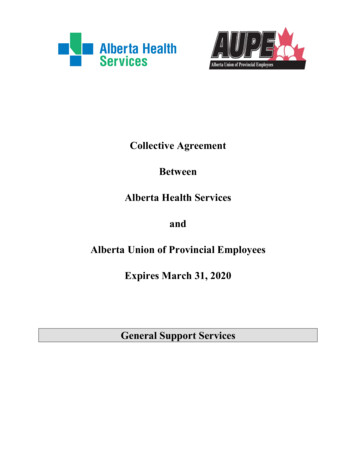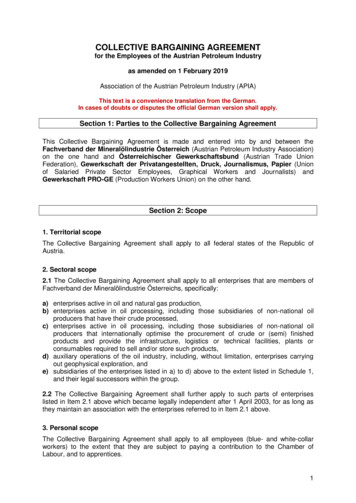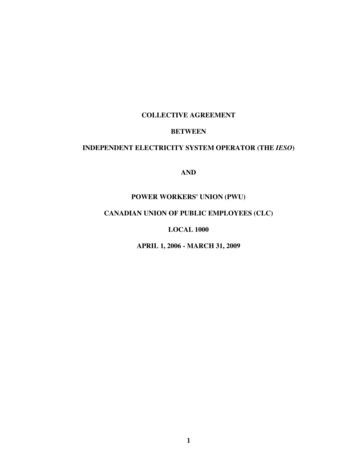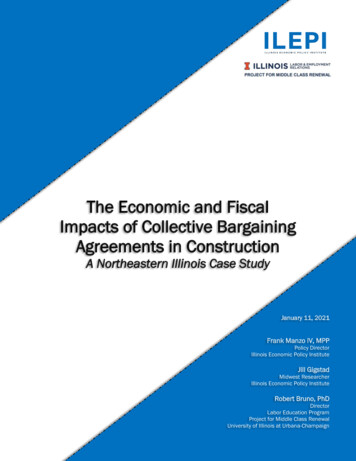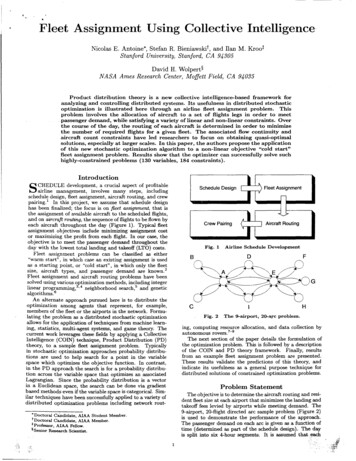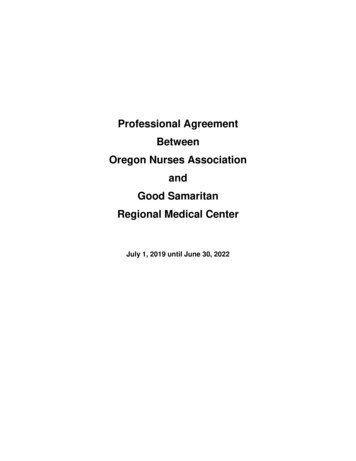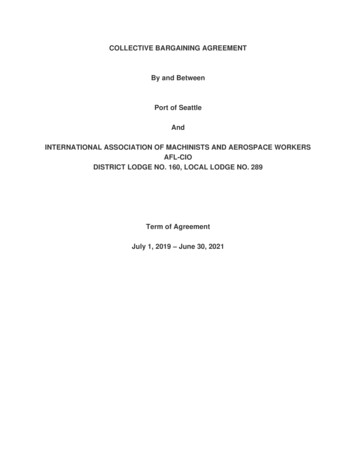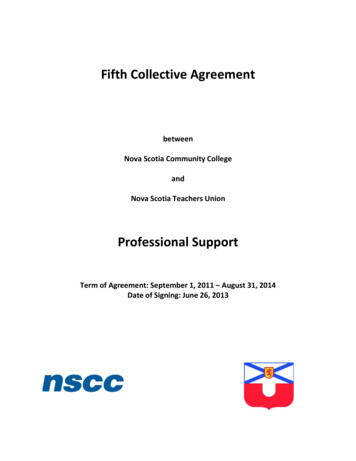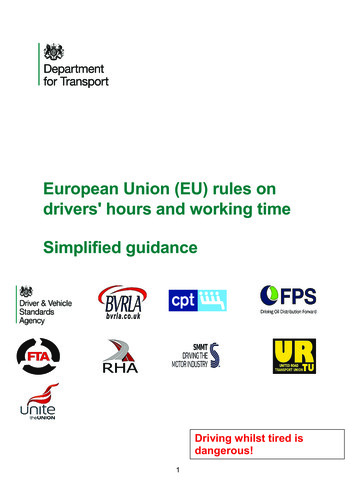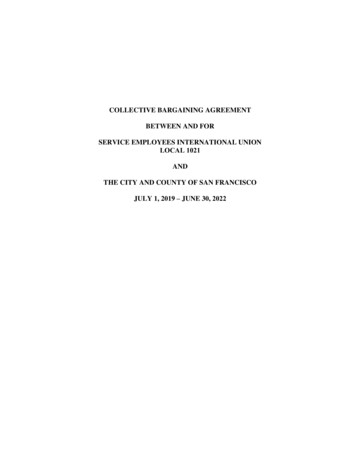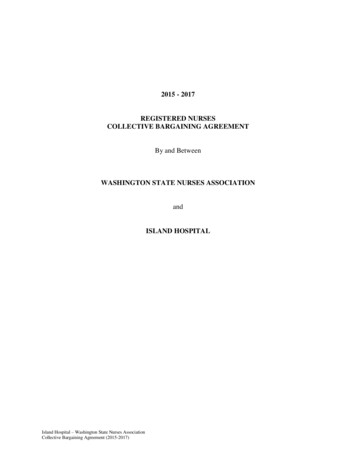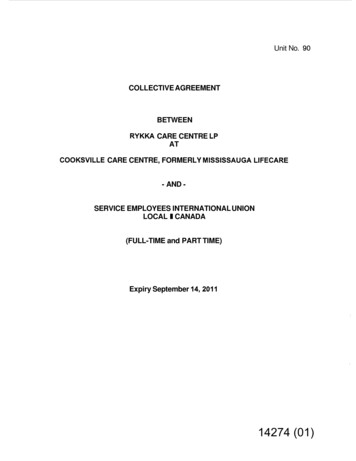
Transcription
Unit No. 90COLLECTIVE AGREEMENTBETWEENRYKKA CARE CENTRE LPATCOOKSVILLE CARE CENTRE, FORMERLY MISSISSAUGA LIFECARE- AND SERVICE EMPLOYEES INTERNATIONAL UNIONLOCAL I CANADA(FULL-TIME and PART TIME)Expiry September 14,201114274 (01)
INDEXPAGEARTICLE 1PURPOSE .1ARTICLE 2SCOPE & RECOGNITION.1ARTICLE 3MANAGEMENT RIGHTS.1ARTICLE 4DEFINITIONS .2ARTICLE 5UNION SECURITY .2ARTICLE 6NO STRIKES OR LOCKOUTS .4ARTICLE 7UNION REPRESENTATION AND COMMITEES .7.04 Labour Management Committee .7.05 CMVRAI MDS 2.0 Language.455ARTICLE 8GRIEVANCE AND ARBITRATION PROCEDURE .6ARTICLE 9SENIORITY .9.01 Effect of Absence .9.02 Probationary Period .9.05 Seniority Lists.9.06 Loss of Seniority .9.08 Nursing Home Transfers .1111121213ARTICLE 10JOB SECURITY .10.01 Layoff and Recall .10.02 Layoff Procedure .10.03 Recall Rights .10.04 Benefits on Layoff .10.05 Full-Time to Pgrt-Time Conversion .10.06 Severance Pay .1717ARTICLE 11JOB POSTING.11.01 Job Posting .11.09 Temporary Vacancies .11.1 1 Permanent Transfers .17171920ARTICLE 12NO CONTRACTING OUT .21ARTICLE 13WORK OF THE BARGAINING UNIT.13.03 Full-time/Part-time Ratio.2121ARTICLE 14PRINTING.21ARTICLE 15LEAVE OF ABSENCE .15.01 Personal Leaves .15.02 Pregnancy and Parental Leave .15.03 Pregnancy Leave .21212222
Parental Leave .Union Leave .Bereavement Leave .Jury and Witness Duty .Educational Leave.Election to Public Off ice .242626272828ARTICLE 16HOURS OF WORK .16.02 Work Schedule.16.03 Lunch or Meal Periods .16.04 Relief Periods .29293030ARTICLE 17PREMIUM PAYMENTS . 3117.01 Overtime. 3117.02 Shift PremiumsNVeekend Premium . 3217.03 Minimum Reporting Pay .3217.05 Call Back . :.3217.06 Call In . 3317.07 Responsibility. . Allowance for Work Outsidethe Bargaining Unit. 33ARTICLE 18ALLOWANCES .18.01 Uniform Allowance .3434ARTICLE 19HEALTH AND SAFETY .34ARTICLE 20PAID HOLIDAYS .39ARTICLE 21VACATIONS .41ARTICLE 22HEALTH AND INSURANCE BENEFITS.22.01 Benefits Preamble .22.02 0.H.I.P .22.03 Life Insurance .22.04 Major Medical.22.05 Vision Care.22.06 Dental.22.07 Hearing Aid .22.08 Benefit Enrolment Requirements .22.09 Change of Carriers .22.10 Benefit Grievance Resolution.22.11 The Nursing Homes and Related IndustriesPension Plan .22.12 Benefits Past Age 65 .22.13 Permanent Part-Time Employee Proration 51Formula Benefits .22.14 New Employment .17IARTICLE 23INJURY AND DISABILITY .4851515252.
ARTICLE 24SICK LEAVE . 5424.01 Sick Leave Provision. 5424.02 Full-time/Part-time Sick Leave Transfers . 5624.05 Annual Medical and Sick Leave Certificate . 5724.06 Workplace Safety and Insurance Board Challenge . 57ARTICLE 25COMPENSATION.25.02 Retroactivity .25.03 Temporary Transfers.25.04 New Classification .25.05 Wage Progression.5858585859ARTICLE 26BULLETIN BOARDS.59ARTICLE 27PAY DAYS .27.01 Pay Days.27.03 Errors on Pay Cheques .595960ARTICLE 28INTERPRETATION.61ARTICLE 29PERSONAL FILES .29.01 Letters of Reprimand.29.02 Suspension .616161ARTICLE 30PAID EDUCATION FUND .61ARTICLE 31TERM .61Schedule “A:Wage Schedule.Part Time Addendum.Central Letters of Understanding.Jurisdiction Letter of Understanding .636573771.2.3.4.
-ARTICLE 1 PURPOSE1.01 The purpose of this Agreement is to establish an orderly collective bargainingrelationship between the Employer and the employees concerned and to providemechanisms for the prompt and equitable disposition of grievances, establish andmaintain satisfactory working conditions, hours of work and wages for allemployees within the bargaining unit.-ARTICLE 2 SCOPE AND RECOGNITIONThe Employer recognizes the Union as the sole collective bargaining agent for allits employees in the nursing homes in the Province of Ontario, save and exceptregistered nurses, physiotherapists, occupational therapists, supervisors,foremen, persons above the rank of supervisor or foreman, off ice staff , personsregularly employed for not more than twenty-two and one-half (22%) hours perweek, and students employed during the school vacation period.2.02The Employer undertakes that it will not enter into any other agreement or contractwith those employees for whom the Union has bargaining rights either individuallyor collectively which will conflict with any of the provisions of this Agreement.2.03Where the feminine pronoun is used in this Agreement, it shall mean and includethe masculine pronoun where the context so applies.2.04Where the singular is used, it may also be deemed to mean the plural, within theappropriate context.2.05Any reference to doctor will include, where appropriate, nurse practitioner.2.06 The Union and Employer agree to abide by the Human Rights Code.-ARTICLE 3 MANAGEMENT RIGHTS3.01 The Union acknowledges that all management rights and prerogatives are vestedexclusively with the Employer and, without limiting the generality of the foregoing, itis the exclusive function of the Employer:(a)to determine and establish standards and procedures for the care, welfare,safety, and comfort of the residents in the nursing home;(b)to maintain order, discipline, and efficiency, and in connection therewith toestablish and enforce reasonable rules and regulations. Such rules will bemade available to all employees and to the Local Union. The Employeragrees prior to the introduction of any new policy or procedure related to1
terms and conditions of employment the Union will be advised byproviding a copy of such policy to a Union Steward or through the LabourManagement Committee.(c)to hire, transfer, layoff, recall, promote, demote, classify, assign duties,discharge, suspend or otherwise discipline employees who have completedtheir probationary period for just cause, provided that a claim ofdiscriminatory transfer, promotion, demotion of classification or a claim thatan employee who has completed her probationary period, has beendischarged or disciplined without just cause, may be the subject of agrievance and dealt with as hereinafter provided. The discharge of aprobationary employee shall be solely at the discretion of the Employer on arational basis;(d)to have the right to plan, direct and control the work of the employees andthe operations of the nursing home. This includes the right to introduce newand improved methods, facilities, equipment, and to control the amount ofsupervision necessary, combining or splitting up of departments, workschedules, and the increase or reduction of personnel in any particular areaor on the whole.-ARTICLE 4 DEFINITIONS4.01Permanent part-time employees are hereby defined to be those persons thatregularly work on the average more than forty-five (45) hours bi-weekly but lessthan seventy-five (75) hours bi-weekly who have completed the probationary perioddescribed in Article 9.02. Article 22.12 describes how this Agreement shall affectthose persons.4.02 Permanent part-time employees shall be known as probationary employees untilthey have worked fifty (50) days.4.03 The seniority of a permanent part-time employee, who has completed theprobationary period requirement, shall date fifty (50) working days prior to the dateon which the employees completed her probationary period.4.04The terms “regular pay” and “straight pay” when used in this Agreement, shallmean the amounts indicated in the wage classification contained in Schedule “A.-ARTICLE 5 UNION SECURITY5.01Each of the parties hereto agrees that there will be no discrimination, interference,restraint or coercion exercised or practised upon any employees because ofmembership in the Union.2
5.02 (a)All employees who are in the employ of the Employer at the signing dateof this Agreement and all new employees who enter the employ of theEmployer after the Agreement has been signed, shall as a condition ofemployment, be subject to regular monthly dues to be deducted from theirwages and also be subject to a one time union dues administrativeassessment for newly hired employees and remitted to the Union. It isunderstood that dues shall be deducted from all employees beginning intheir first (1st) month of hire.The Employer shall, when remitting such dues, name the employees, note anyemployees currently on leave, and provide employees numbers from whose paydeductions have been made.(c)The Employer will supply the Union with the name, current address,classification and other relevant information of the employees with the first(1") dues deduction.If the nursing home agrees to provide the Union with information in anelectronic format, the parties will meet to discuss the format in which theinformation will be set out. The parties will endeavour to communicate onthis issue so that implementation is not impeded.The nursing home agrees to provide the Union with employee's address on the first(1"') dues deduction and on an annual basis.5.03 (a)Deductions shall be made from the first (lst) pay of each month andforwarded to the Union Office on or before the last of the same month inwhich the deductions are made, where practicable.(b)Union dues are not deducted from SUB plan payments and the Employerhas no responsibility for Union dues while an employee is off onPregnancy and/or Parental Leave.5.04 (a)The Union and its members shall hold the Employer harmless with respectto any liability in which the Employer might incur as a result of deductionsand remittances.(b)The Employer will provide each employee with a T4 slip showing theannual Union dues paid by that employee for the year previous.5.05It is mutually agreed that arrangements will be made for a Union Steward tointerview each new employee who is not a member of the Union once during thefirst thirty (30) days of an employment for the purpose of informing such employeeof the existence of the Union in the nursing home, and of ascertaining whether theemployee wishes to become a member of the Union. The Employer shall advisethe Union monthly as to the names of the persons listed for interview and the time3
and place on the premises of the Employer designated for each such interview, theduration of which shall not exceed fifteen (15) minutes.5.06Emplovment of Disabled EmploveesThe Union and the Employer acknowledge their obligations to accommodatecertain individuals under the Human Rights Code of Ontario and agrees that thiscollective agreement will be interpreted in such a way as to permit thoseobligations to be discharged.-ARTICLE 6 NO STRIKES OR LOCK-OUTS6.01The Union agrees that there shall be no strikes and the Employer agrees that thereshall be no lockouts. The meaning of the words "strike" and "lockout" shall be asdefined in the Ontario Labour Relations Act, as amended.-ARTICLE 7 UNION REPRESENTATION AND COMMITTEES7.017.02(a)It is mutually agreed that, where negotiations are conducted on a joint basisbetween any or all of the nursing homes, the Union will elect or otherwiseselect a negotiating committee consisting of one (1) representative fromeach nursing home.(b)If negotiations are carried on individually for any or all of the nursing homes,it is agreed that the Union will elect or otherwise select a negotiatingcommittee consisting of three (3) employees, one (1) of which shall be theChief Steward.(c)All members of the committee shall be regular employees of the Employerwho have completed their probationary period.(d)The nursing home members of the Committee will be paid by the Employerfor time used during normally scheduled working hours in negotiation of thisAgreement or its successor including all conciliation proceedings butexcluding any Arbitration proceedings.The Employer will recognize a Union Administrative Committee for both the full-timeand part-time bargaining units, which shall consist of a Chief Steward and four (4)stewards, at least one (1) of which shall be a member of the part-time bargainingunit. Not more than two (2) committee members shall meet with Management atone (1) time. The Employer shall be advised of the names of members of thiscommittee and shall be notified of any changes from time to time.All members of the committee referred to above shall be regular employees of theEmployer who have completed their probationary period.4
7.03 The Union acknowledges that the members of the Union Administrative Committeemust continue to perform their regular duties, and that so far as possible allactivities of the committee will be carried on outside the regular working hours ofthe members thereof, unless otherwise mutually arranged.The Employer shall pay representatives and Committee members their respectivewages for all time lost from regularly scheduled hours investigating and/orprocessing grievances, up to but not including the arbitration stage, negotiation ofthe Agreement and renewals thereof, up to and including conciliation, and whileattending meetings with the Employer. Employees on the evening and night shiftshall receive paid time off for the actual day of the negotiating meeting.7.04Labour Manaqement CommitteeWhere there are matters of mutual concern and interest that would be beneficialif discussed at a Labour-Management Committee meeting during the term of thisAgreement, the following will apply.An equal number of representatives of each party as mutually agreed shall meetat a time and place mutually satisfactory. A request for such meeting will bemade in writing at least one (1) week prior to the date proposed andaccompanied by an agenda of matters proposed to be discussed, which shall notinclude matters that are properly the subject of a grievance or matters that areproperly the subject of negotiations for the amendment or renewal of thisAgreement. Suitable subjects for discussion will include orientation, aggressiveresidents and workload issues.A representative attending such a meeting shall be paid for wages lost fromregularly scheduled hours. A Union staff member may attend as a representativeof the Union. Meetings will be held quarterly unless otherwise agreed.It is understood that where full and part-time agreements are separate, thereshall be one (1) committee only.7.05CMI/RAI MDSRecognizing the mutual objective of quality care, the Employer agrees to meetthrough the Labour Management Committee with the Union as soon aspracticable after the receipt of the annual CMVRAI MDS 2.0 (as amended)results. The Employer agrees to provide the Union Representative with staffinglevels, and staffing mix information; the impact of related payroll costs on staffinglevels and a written notice of the CMVRAI MDS 2.0 (as amended) results for thefacility.5
The purpose of this meeting is to discuss the impact of the CMI/RAI MDS 2.0 (asamended) changes on the staffing levels in the facility, and quality care, andprovide the Union with an opportunity to make representation in that regard.The parties shall meet as necessary to discuss other changes or workloadissues.The parties may invite additional participants to attend the meeting to supportconstructive review and discussion.ARTICLE 8- GRIEVANCE AND ARBITRATION PROCEDURE8.01 Complaints and Grievances(a)A grievance under this Agreement shall be defined as any difference ordispute between the Employer and any employee relating to theinterpretation, application or administration of this Agreement, including anyquestions as to whether the matter is arbitrable and an allegation that thisAgreement has been violated.(b)All complaints and grievances shall be taken up in the following manner:Steo Number 1An employee having a question or complaint shall refer it to his immediatesupervisor within eight (8) working days of the actual occurrence leading to thequestion or complaint. The Supervisor shall reply to the employee, giving theanswer to the complaint or question within two (2) working days from date ofsubmission.Step Number 2If further action is then to be taken, then within five (5) working days after thedecision is given in Step Number 1, the employee, who may request theassistance of his or her steward, shall submit the grievance in writing to theDirector of Administration. A meeting will then be held between the Director ofAdministration or his designated representative and the employee. It isunderstood that at such a meeting the Director of Administration or hisdesignated representative may have such counsel and assistance as he maydesire, and that the employee may have his steward and that the SElU UnionRepresentative or an International Representative of the Union may also bepresent at the request of either the employee or the Employer. The decision ofthe Director of Administration or his designated representative shall be given inwriting within five (5) working days following the meeting.b
Step Number 3Should the Director of Administration fail to render his decision as required inStep Number 2, or failing settlement of any grievance under the foregoingprocedure arising from the interpretation, application, administration or allegedviolation of this Agreement, including any question as to whether a matter isarbitrable, the grievance may be referred to Arbitration by either the Employeror the Union. If no written request for Arbitration is received within five (5)working days after the decision under Step Number 2 is given, or within ten (10)working days following the meeting under Step Number 2 of the grievanceprocedure, the grievance shall be deemed to have been abandoned and thesame grievance shall not be the subject matter of a further grievance.8.02Any of the time allowances above may be extended by mutual agreement of theparties.8.03In determining the time within which any action is to be taken or completed underthe terms of this Agreement, such time limits shall be exclusive of Saturdays,Sundays and paid holidays.8.04An employee subject to disciplinary action which is to be recorded in theemployee’s personnel file shall have the right to the presence of a UnionSteward. The Union Stewards undertake to be reasonably available in person orby telephone for such meeting. In extraordinary circumstances when a UnionSteward is entirely unavailable the employee shall have the right to the presenceof a Union committee member or a member representative of the employee’schoice who is working on the current shift.8.05Discharqe GrievanceIn the event of an employee who has completed his probationary period beingdischarged from employment, and the employee feeling that an injustice hasbeen done, the case may be taken up as a grievance.All such cases shall be taken up within four (4) days and disposed of withinseven (7) days (or such longer period as may be mutually agreed upon) of thedate the employee is notified of his discharge, except where a case is taken toarbitration. A claim by an employee, who has attained seniority, that he hasbeen unjustly discharged from his employment shall be treated as a grievance ifa written statement of such grievance is lodged with the Director ofAdministration within four (4) days after the employee is notified of his dischargeor within four (4) days after the employee is notified of his discharge or within four(4) days after the employee ceases to work for the Employer, whichever is theearlier. All steps of the grievance procedure prior to Step Number 2 may beomitted in such cases.7
Such special grievances may be settled by confirming the Employer’s action indismissing the employee, or by re-instating the employee with full compensationfor time lost, or by any other arrangement which is just and equitable in theopinion of the conferring parties or the Board of Arbitration, as the case may be.8.06Emplover’s GrievancesThe Employer may institute a grievance consisting of an allegation of a generalmisinterpretation or violation of this Agreement (by the Union or any employeecovered by this Agreement), in writing, at Step Number 2 of the grievanceprocedure, by forwarding a written statement of said grievance to the SEW UnionRepresentative, providing it is presented within ten (10) working days after thecircumstances giving rise to the grievance have originated or occurred; the SElUUnion representative shall give his decision in writing within five (5) working daysafter receiving the written grievance and failing settlement, the grievance may bereferred to arbitration by the Employer in accordance with Step Number 3 of thegrievance procedure.8.07Union Policy GrievanceThe Union may institute a grievance consisting of an allegation of a generalmisinterpretation or a violation by the Employer of this Agreement in writing atStep Number 2 of the grievance procedure, providing that it is presented withinten (10) working days after the circumstances giving rise to the grievance haveoriginated or occurred. However, it is expressly understood that the provisions ofthis clause may not be used to institute a grievance directly affecting anemployee or employees which such employee or employees could themselvesinitiate and the regular grievance procedure shall not be thereby bypassed.8.08Group GrievanceWhere a number of employees have similar grievances and each employeewould be entitled to grieve separately, they may present a group grievanceidentifying each employee who is grieving to the Department Head or hidherdesignate within seven (7) days after the circumstances giving rise to thegrievance had occurred, or ought reasonably to have come to the attention of theemployees. The grievance shall then be treated as being initiated at StepNumber 2 and the applicable provisions of this article shall then apply withrespect to the processing of such grievance.8.09Grievance Process(a)Either party, with the agreement of the other party, may submit agrievance to Grievance Mediation at any time within ten (10) days after theEmployer’s decision has been rendered at the step prior to arbitration.8
Where the matter is so referred, the mediation process shall take placebefore the matter is referred to Arbitrator.Grievance Mediation will commence within twenty-one (21) days of thegrievance being submitted to mediation, or longer period as agreed by theparties.No matter may be submitted to Grievance Mediation which has not beenproperly carried through the grievance procedure, provided that the partiesmay extend the time limits fixed in the grievance procedure.The parties shall agree on a mediator.Proceedings before the Mediator shall be informal. Accordingly, the rulesof evidence will not apply, no record of the proceedings shall be made andlegal counsel shall not be used by either party.If possible, an agreed statement of facts will be provided to the Mediator,and if possible, in advance of the Grievance Mediation Conference.The Mediator will have the authority to meet separately with either party.If no settlement is reached within five (5) days following GrievanceMediation, the parties are free to submit the matter to Arbitration inaccordance with the provisions of the collective agreement. In the event thata grievance which has been mediated subsequently proceeds to arbitration,no person serving as the Mediator may serve as an Arbitrator. Nothing saidor done by the mediator may be referred to Arbitration.The Union and Employer will share the cost of the Mediator, if any.8.10 Arbitration Processa)When either party requests that a grievance be submitted to Arbitration,the request shall be in writing addressed to the other party to thisAgreement and shall contain the name of the first party’s nominee to theBoard of Arbitration. The recipient of the notice shall, within ten (10) daysthereafter designate its nominee to the Board of Arbitration. The two (2)so nominated sha
Steward. The Union Stewards undertake to be reasonably available in person or by telephone for such meeting. In extraordinary circumstances when a Union Steward is entirely unavailable the employee shall have the right to the presence of a Union committee member or a member representative of the employee's
